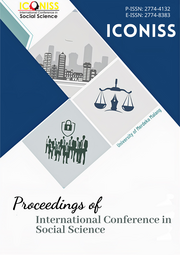The Effectiveness of the Quasi Judicial Authority of Samarinda City Bawaslu in Handling Election Administrative Violations
DOI:
https://doi.org/10.26905/iconiss.v3i1.9830Keywords:
Bawaslu, Election, Quasi judicialAbstract
The presence of additional independent state institutions is becoming increasingly important in order to maintain the democratization process that is being developed by a country that has just broken away from the authoritarian system. In this context, through election activities, Bawaslu is positioned as a driver of the democratization process. The Authority of Bawaslu Based on Law no. 7 of 2017 in addition to the Election Organizing Supervisory Agency, is also authorized to settle disputes over the election process up to the Regency/City Bawaslu level. The Quasi-Judicial Authority receives, examines, reviews, and decides on election administration violations. This study is to analyze the effectiveness of implementing the Quasi-Judicial Authority of the Samarinda City Bawaslu in Handling Election Administrative Violations as well as the obstacles and obstacles. The type of research is sociological legal research (empirical juridical) with analytical descriptive nature. The results of this study indicate that the Samrinda City Bawaslu in carrying out its function as a Quasi-Judicial has not been matched by competent Human Resources in the field of law because its new authority to convene and try and decide as a judge in a court, of course, requires ability and maturity. Bawaslu of Samarinda City in carrying out its quasi-judicial authority there are obstacles and obstacles in handling election administrative violations and resolving election violations.
Â
Downloads
References
Ali, M. (2020). Pelaksanaan kewenangan yudisial bawaslu dalam menyelesaikan sengketa proses pemilu [Tesis, Universitas Muria Kudus].
Amal, B. (2019). Kewengan mengadili oleh bawaslu atas sengketa proses pemilu yang diatur dalam peraturan komisi pemilihan umum. Jurnal Masalah-Masalah Hukum, 48(3).
Anwar, A. H. (2019). Peran bawaslu dalam penegakan hukum dan keadilan pemilu. Voice Justisia : Jurnal Hukum dan Keadilan, 3(2)
Ayuni, Q. (2018). Gagasan pengadilan khusus untuk sengketa hasil pemilhan kepala daerah. Jurnal Hukum & Pembangunan, 48(1).
Esfandiari, F., & Fatih, S. A. (2020). Initiating a permanent electoral body to resolve dignified election disputes: Assessing the effectiveness of Gakkumdu. Yustisia Jurnal Hukum, 9(3).
Fionna, U., & Tomsa, D. (2017). Parties and factions in Indonesia: The effects of historical legacies and institutional engineering. ISEAS Working Paper No. 2017.
Junaidi, V., & Syahda, A. (2017). Mekanisme penanganan pelanggaran administrasi pemilu dalam UU Nomor 7 Tahun 2017. Jurnal Bawaslu, 3(1), 49-64.
Mahfud, M. (1999). Hukum dan pilar-pilar demokrasi. Yogyakarta: Gama Media.
Patawari, P. (2019). Sistem peradilan di Indonesia. Makassar.
Rumadan, I. (2017). Peran lembaga peradilan sebagai institusi penegak hukum dalam penegakan keadilan bagi terwujudnya perdamaian. Jurnal Rechts Vinding: Media Pembinaan Hukum Nasional, 6(1).
Saleh, M., & Hufron, H. (2021). Kewenangan badan pengawas pemilihan umum dalam mengadili sengketa proses pemilu dan pelanggaran administratif pemilu. Voice Justisia: Jurnal Hukum dan Keadilan, 5(2), 54-72.
Sinaga, P. H. W., Wiratama, F. P. B., Indriati, F., Rahayu, D. A., & Sunarjo, S. (2022). Social control of government policy through the citizen lawsuit mechanism. Jurnal Cakrawala Hukum, 13(2), 123-134.
Susanto, A. (2020). Kewengan judisial badan pengawas pemilu dalam perspektif Asas Nemo Judex in Causa Sua. MLJ Merdeka Law Journal, 1(2).
Downloads
Published
Issue
Section
License
Authors who publish in this journal agree to the following terms:
(1)Â Copyright of the published articles will be transferred to the journal as the publisher of the manuscripts. Therefore, the author confirms that the copyright has been managed by the journal.
(2) Publisher of Proceedings of International Conference in Social Science is the University of Merdeka Malang.
(3) The copyright follows Creative Commons Attribution–ShareAlike License (CC BY SA): This license allows to Share — copy and redistribute the material in any medium or format, Adapt — remix, transform, and build upon the material, for any purpose, even commercially.

